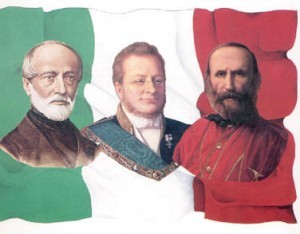Europe witnessed a dramatic rise in nationalist fervor in the middle of the nineteenth century, leading to the unification of Italy and the German states. Giuseppe Mazzini’s On Nationality highlighted the trend towards uprisings under the banner of liberty rather than uprisings for the sake of power or wealth. ((Giuseppe Mazzini, On Nationality, 1852)) With cries for liberty came cries countries to be united based on nationality. Mazzini campaigned for Italy to be a country comprised of “a human group called by its geographical position, its traditions, and its language,” which he believed would result in a peaceful nation of common peoples. ((Mazzini, On Nationality)) Mazzini, a politician and the driving force behind the movement for Italian unification, wrote to convince his contemporaries of a necessary redrawing of the map of Europe, with nationality rather than conquest being the basis for borders. Concurrently, the multitude of German states had become an object of war between Prussia and Austria.
In 1849, National Assembly in Frankfurt offered the German crown to the Prussian King Friedrich Wilhelm IV. ((Johann Gustav Droysen, Speech to the Frankfurt Assembly,1848)) In an earlier speech, Johann Gustav Droysen, a member of the assembly, argued for the superiority of Prussia over Austria because Prussia’s monarchy was “wholly German.” A Prussian Imperial Proclamation accepting the German crown in 1871 reiterated this nationalist connection. Wilhelm acquired power over Germany as a “duty to [their] common fatherland,” and asserted responsible for protecting the rights of all those in the German Empire. ((The Imperial Proclamation, 1871)) The simultaneous unifications of both nations were symptoms of nationalist zeal and a desire to live amongst, and be ruled by kinsmen. While considering the role nationalism played in shaping our understanding of nations and borders, I want to ask what influences (i.e. the French Revolution) may have spurred on the fervor in the nineteenth century, and what examples of nationalism exist today.

